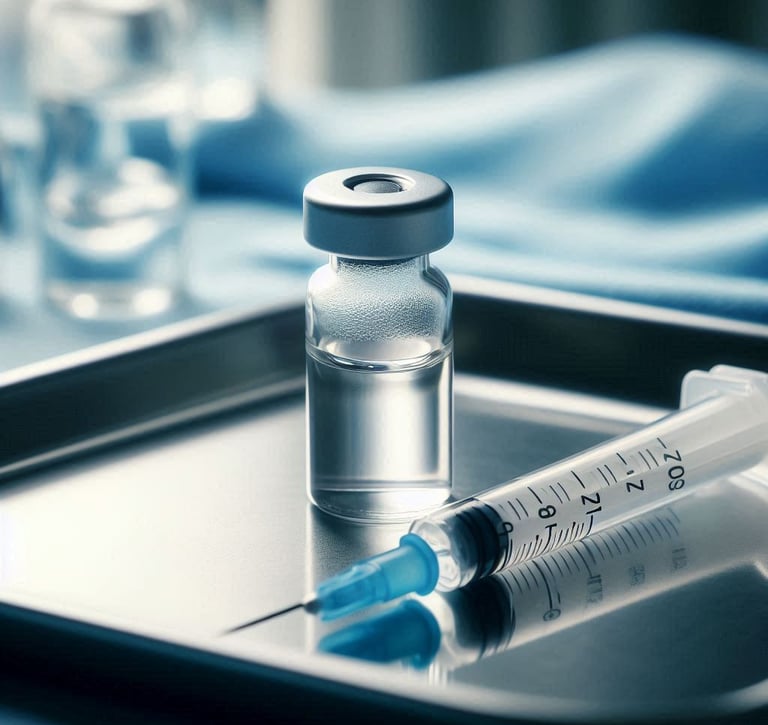Stay updated on what is trending in health. Discover tips and resources for a healthier, balanced life.
Vaccines: What They Are and Why They Matter to You
Discover how vaccines protect you and your community. Learn the truth about vaccine safety, side effects, and herd immunity in this easy-to-understand guide.
HEALTHCARE SERVICES
Dr. S. Ali
1/14/20263 min read


Ever wondered how a tiny shot in the arm can protect you from some pretty serious diseases? That’s the power of vaccines — small but mighty defenders of your health. Let’s break it down in a simple, no-nonsense way.
What Exactly Is a Vaccine?
A vaccine is like a training course for your immune system. It teaches your body how to recognize and fight off viruses or bacteria before you actually get sick. It’s kind of like showing your immune system a “wanted” poster of the bad guy — so it knows what to do if the real threat shows up.
There are different types of vaccines (like mRNA, inactivated, or live-attenuated), but they all serve the same purpose: to build your body’s defenses without making you seriously ill.
Why Are Vaccines Important?
Here’s the thing — vaccines don’t just protect you. They help protect everyone around you, especially those who can’t get vaccinated due to age or health reasons. This is called herd immunity, and it's like creating a safety net for the entire community.
Vaccines have helped wipe out or control deadly diseases like:
Polio
Smallpox
Tetanus
What is Herd Immunity?
Herd immunity is when enough people in a community are immune to a disease — either through vaccination or previous infection — that the disease has a hard time spreading from person to person.
In simple terms: If most people around you are protected, it helps protect everyone, even those who can’t get vaccinated, like newborns or people with certain medical conditions.
Herd immunity is especially important for preventing outbreaks of highly contagious diseases like measles, flu, or COVID-19. But it only works if a large enough portion of the population is immune — that’s why vaccines are so important.
Common Myths (and the Truth)
Let’s clear up a few things:
“Vaccines cause the disease.”
Nope. Most vaccines use weakened or inactive parts of a virus that can’t cause the disease — they just help your body learn to fight it.
“Natural immunity is better.”
Sure, your body can fight off infections naturally. But some diseases (like measles or meningitis) can cause serious complications. Vaccines give you protection without risking your health.
“Vaccines aren’t safe.”
Vaccines go through rigorous testing and ongoing monitoring for safety. Serious side effects are extremely rare.
What About Side Effects?
Most people have mild side effects like:
Soreness at the injection site
A slight fever
Fatigue
These are all signs your body is doing its job — building protection.
Serious side effects? They’re extremely rare — far less common than the complications from the diseases vaccines prevent. Health authorities like the CDC and WHO continually monitor vaccine safety to ensure any risks remain very low.
When and Where Should You Get Vaccinated?
Children need several vaccines in the first few years of life.
Teens and adults need booster shots and seasonal vaccines (like the flu shot).
Seniors may need extra protection, like the shingles or pneumonia vaccines.
Your doctor or local health clinic can guide you based on your age and health needs.
What is a Booster Vaccine?
A booster vaccine is an additional dose given months or years after initial vaccination to 'boost' waning immunity. It reinforces your body’s defenses against evolving viruses, like COVID-19 variants, ensuring longer and stronger protection.
The NB.1.8.1 COVID variant highlights why boosters matter: its mutations help it evade immunity from past infections or older vaccines. Updated boosters target recent strains like this, restoring protection against severe illness, hospitalization, and long COVID—especially critical for high-risk groups. Since immunity wanes after 4–6 months, staying current with boosters ensures your defenses keep pace with the virus’s evolution.
How Vaccines Save Lives (and Money)
Vaccines don’t just prevent you from getting sick — they’re powerful tools that save millions of lives every year by stopping the spread of dangerous diseases like measles, polio, and whooping cough.
Now imagine paying the hospital bills for treating these serious illnesses — not to mention the time off work, the stress, and potential long-term effects.
Vaccines help avoid all of that by preventing disease in the first place. They’re one of the smartest and most cost-effective investments in public health.
But that’s not all. Vaccines also help reduce the burden on healthcare systems by cutting down hospital visits, preventing long-term health complications, and lowering medical costs.
Simply put: vaccines are one of the most effective and affordable ways to protect public health and save money in the long run.
Final Thoughts
Think of vaccines as seatbelts for your immune system — they’re simple, protective, and could save your life.
Whether you're a parent trying to keep your child healthy, a traveler planning a safe trip, or just someone looking to protect yourself and others, staying up-to-date with your vaccinations is one of the smartest health decisions you can make.
It’s a small step with a big impact — for you, your loved ones, and your community.
Sources:
World Health Organization (WHO) – Vaccine Safety
https://www.who.int/news-room/questions-and-answers/item/vaccines-and-immunization-vaccine-safety
Centers for Disease Control and Prevention (CDC) – Vaccine Safety
https://www.cdc.gov/vaccine-safety/index.html
UNICEF – Immunization Overview
https://www.unicef.org/immunization
Institute for Vaccine Safety – Johns Hopkins University
https://www.vaccinesafety.edu/
Saudi Ministry of Health – Hajj Requirements: Vaccine Guidelines for Pilgrims
https://www.moh.gov.sa/en/Hajj/HealthGuidelines/Pages/Vaccination.aspx
.
Pulse Your Health
Empowering you to achieve your health goals.
Contact
© 2026. All rights reserved.
Disclaimer: The content on this website is for informational purposes only and is not medical advice. Always seek the advice of your physician or other suitably qualified healthcare professional for diagnosis, treatment and your health related needs.
